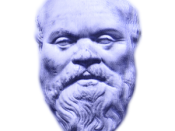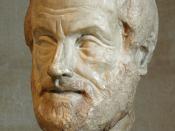Imagination is traditionally defined as the mental capacity for experiencing, constructing, or manipulating mental imagery. It is the image of something that is neither "perceived as real nor present to the sense." Imagination is also generally regarded as responsible for fantasy, inventiveness, and creative, original, and insightful thought. Sometimes, it also accounts for a much wider range of mental activities dealing with the "non-actual", such as supposing, pretending, thinking of possibilities, and even being mistaken. Despite being a familiar word of everyday language, within Philosophy, imagination is a very complex and intricate concept.
The Meditations represent Descartes' effort to defeat skepticism by showing that if one proceeds to systematically consider the matter, there are truths which one simply cannot doubt. He does this by jointly using a method of doubt with a method of analysis. The method of doubt involves posing more and more powerful skeptical hypotheses which call into doubt classes of knowledge claims.
The three faculties by which Descartes holds that we might come to know things are the senses, the imagination and reason or understanding. Early on in the Meditations, Descartes provides arguments to discount all truths derived from the senses and the imagination. While Descartes may not believe that the imagination is a route which ultimately leads towards truth, he uses both his imagination as well as rational arguments about the faculty of imagination in order to guide him on his journey. If this faculty was discounted early in his Meditations, why is it apparently a necessary tool to build his foundation of truths?
It is important to examine Descartes' use of imagination in its historical context. The concept of the imagination seems to have been first introduced into philosophy by Aristotle, who tells us, "imagination [phantasia] is (apart from any metaphorical sense of the word)...


